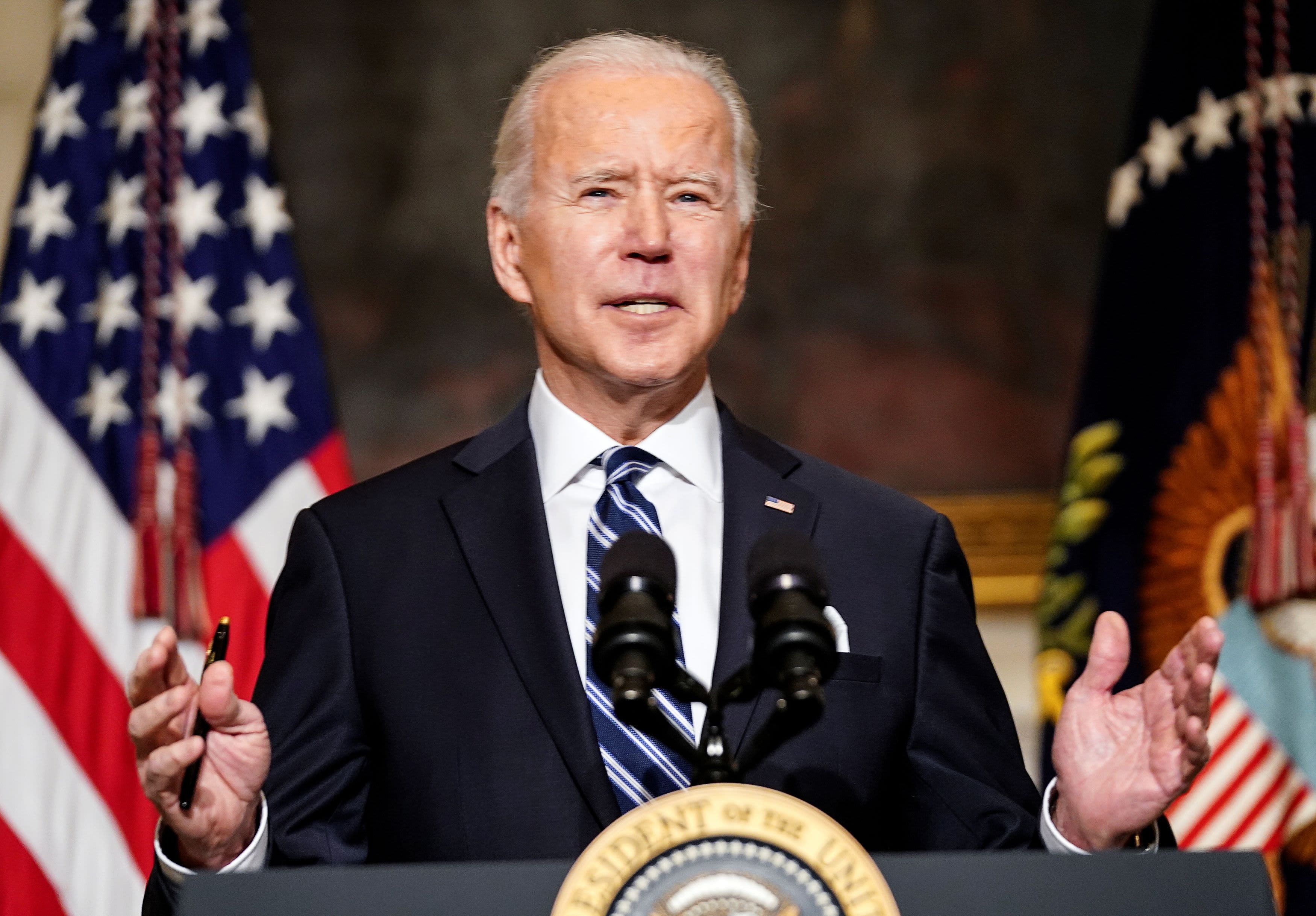U.S. President Joe Biden delivers remarks on tackling climate change prior to signing executive actions in the State Dining Room at the White House in Washington, January 27, 2021.
Kevin Lamarque | Reuters
President Joe Biden has passed an early flurry of executive action on climate change during his first weeks in office, reversing environmental rollbacks from the Trump administration and quickly acting on campaign promises to address global warming.
The president’s orders, though significant, don’t substitute for the administration’s plans to implement more permanent climate legislation, including parts of the $2 trillion proposal to cut planet-warming carbon emissions to zero by 2035 and achieve net-zero emissions by 2050.
Without new climate legislation from Congress, Biden’s orders to reverse Trump’s rollbacks on emissions from vehicles, power plants and oil and gas drilling could be easily undone by a future administration. Many of Biden’s legal reversals could take years to impose too.
What could stand in Biden’s way in passing major climate reform on issues — such as phasing out coal and oil with clean energy technology — is moderate Senate Democrats and Republicans from fossil-fuel states who oppose policies they view as harmful to the industry in their home state.
The Biden administration has a slim Democratic Senate majority that’s 10 votes short of the 60 needed to break the Senate’s filibuster and pass climate bills. The Senate is divided 50-50 with Vice President Kamala Harris as a tie-breaking vote for Democrats.
More from CNBC Environment:
Biden suspends oil and gas leasing in slew of climate executive actions
UN warns nations of major economic damage without climate action
Biden rejoins the Paris climate accord in first move to tackle global warming
Sen. Joe Manchin (D-W.Va.), who opposes ending the filibuster and has broken with his party to defend coal production in West Virginia, is the incoming chairman of the Senate Energy Committee and will yield tremendous power in deciding what passes.
Michael Gerrard, director of the Sabin Center for Climate Change Law at the Columbia Law School, said that while many of Biden’s climate proposals wouldn’t require Congressional action, Congress is essential to appropriate infrastructure spending and help strengthen the Clean Air Act and other regulatory controls to mitigate fossil fuel production.
“Without Congressional action you don’t have the certainty of continuity. You have a loss of momentum, which is a big problem,” Gerrard said. “At the same time, we see the plummeting costs of wind and solar. The market is going to be driving a lot of this without government action.”
Democrats tried but failed to pass climate change legislation when they controlled Congress under former President Barack Obama and will likely face similar difficulty under Biden.
The national emergency option
Senator Chuck Schumer (D-N.Y.), the majority leader, has addressed how difficult major bipartisan reform on climate will be and recently called on the president to declare climate change a national emergency.
Invoking a climate emergency is a controversial move that would give the Biden administration larger authority to circumvent Congress, like redirecting funding for clean energy sources and canceling offshore drilling projects. And the move would certainty face legal challenges.
Actors and activists (L to R) Jane Fonda, Susan Sarandon and Martin Sheen march during the “Fire Drill Fridays” climate change protest and rally on Capitol Hill on January 10, 2020 in Washington, DC.
Paul Morigi | Getty Images
“Trump used this emergency for a stupid wall, which wasn’t an emergency,” Schumer said in an interview on MSNBC earlier this week. “But if there ever was an emergency, climate is one. So I would suggest that they explore looking at climate as an emergency, which would give them more flexibility.”
Democrats could also take advantage of a budget process known as reconciliation in order to pass some tax and spending bills without GOP support. Schumer said Democrats could use this process to ban the production of combustion engines powered by fossil fuels.
“Biden’s actions in his first week speak louder than any words in terms of confronting climate change a national emergency,” said Jeremy Symons, principal at environmental consulting firm Symons Public Affairs and former deputy staff director for the Senate Environment and Public Works Committee.
“If cabinet secretaries determine that they need an official presidential emergency declaration to go big, then the White House can act on that advice, but first things first,” Symons added. “There is no point in rushing into it when you have the full expertise of the government newly at hand.”
As Biden’s climate agenda begins to take shape, some companies have become key allies. General Motors on Thursday announced that it will exclusively offer electric vehicles by 2035, a move that comes as Biden’s team works on legislation for new fuel economy standards.
“Even without regulations, Biden is sending very strong signals to the market,” Gerrard said. “Automakers know that the future is electric. Wind and solar companies know they have bright future. And fossil fuels — not so much.”

